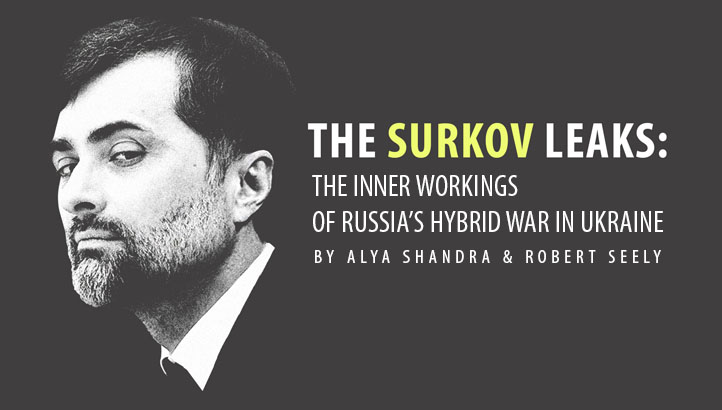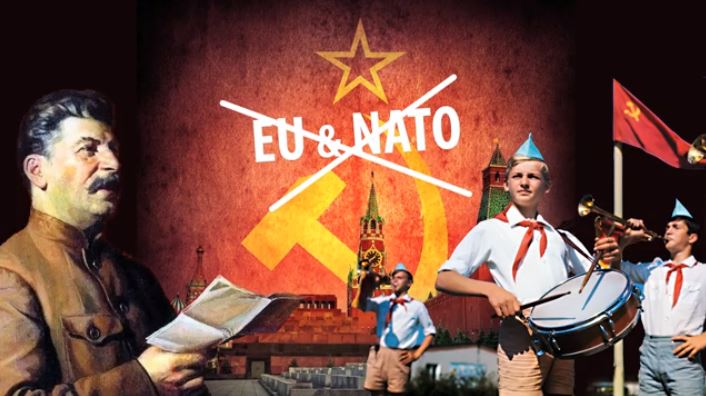A report on how Russia pursues hybrid war to destabilize Ukraine has been published on 16 July 2019 at the UK-based Royal United Services Institute, the world’s oldest independent defense and security think tank. It is the first major study of the Surkov Leaks, three tranches of hacked emails belonging to top Putin advisor Vladislav Surkov and figures around him, which were obtained by Ukrainian cyberactivists in 2016-2017.
Written by Alya Shandra editor-in-chief of the Euromaidan Press, and Bob Seely, Member of Parliament for the Isle of Wight who is also a member of the House of Commons Foreign Affairs Select Committee, the RUSI report entitled “The Surkov Leaks: The Inner Workings of Russia’s Hybrid War in Ukraine” demonstrates how the Kremlin is re-inventing Soviet-era tactics to exert power and destabilize neighboring countries and provides a detailed insiders’ view of Russia’s strategy and tactics for destabilizing Ukraine.
Vladislav Surkov, termed “Putin’s Rasputin” and the “Grey Cardinal of the Kremlin,” has been known as the man informally in charge of Russia’s puppet republics in Donbas, although periodically rumors emerge that he will be removed from his position. The RUSI report shows his influence extending way beyond that, with Surkov curating networks of activists and politicians to implement Russia’s goals in Ukraine – to prevent the country’s movement westward.
The activities revealed in the leaked emails describe how Russia re-invents active measures and uses reflexive control, a Soviet top-secret technique to manipulate an opponent into making decisions leading to his own defeat.
Using these approaches, in Ukraine, Russia interfered in elections, establishes alternative centers of power, and encouraged separatism. The report provides a tactical snapshot of subversion, from the costs of demonstrations to messaging lines, to the tactics of violent destabilization.
The report contains seven sections:
- The Three Tranches of the Kremlin Leaks
- The People Behind Russia’s Hybrid War Against Ukraine
- Ukrainian Vulnerabilities Exploited by Russia’s Hybrid War
- The ‘People’s Republics’ in the Donbas Region
- The Kremlin’s Phantom of Separatism and Chaos in Ukraine
- Political Meddling: How the Kremlin Tried to Change Ukraine’s Constitution
- The Kremlin’s Political Power: Reaching the Ukrainian ‘Soul’
It details Russia’s exertion of its political power over societies by studying target audiences and carefully selecting the messages with which it plans to manipulate them into doing Russia’s bidding. It states: “Relying on the analysis of experts and insiders, the Kremlin carefully and flexibly sought out those psychological dividing lines whose exploitation could create chaos in Ukraine.”
The report explains how Russia uses a “very full spectrum of means and methods,” ranging from support provided by conventional troops and Special Forces (under a fig leaf of deniability) through to economic, political, informational, governance, and diplomatic and public outreach tools.
A central part of this strategy in Ukraine is to encourage separatist statelets in Eastern Ukraine, which, the authors maintain, are in effect Russian entities.
The authors state: “Leaked emails dispatched by President Putin’s aide, Vladislav Surkov, should leave no doubt as to the nature of the conflict in Ukraine: the Kremlin largely manages and finances the war in the Donbas region under the guise of internal separatism, which the Kremlin is equally involved in generating.”
One email shows how Surkov received a document that gives a unique insight into the Kremlin’s response to the MH17 disaster which saw a Malaysia Airlines plane shot down by in Donbas, in an area controlled by pro-Russian rebels. The document provided multiple talking points and conspiracy theories for pro-Russian voices in the Ukrainian media.
The messaging in this document provides more evidence of the cynicism with which the Russian authorities approached the information campaign to create confusion over, and to obfuscate Russian responsibility for, the disaster.
It sought to blame the disaster on Ukraine, casting doubt on whether the plane was civilian, and suggestions that the plane was deliberately directed through the conflict zone.
Other emails belonging to Surkov’s right-hand man Inal Ardzinba show detailed payments to politicians, compliant journalists, and other civil society actors.
Overall, the paper identifies more than 50 tools of Russian influence, which can broadly be categorized into:
- Politics and political violence: the tools formerly associated with Soviet-era ‘active measures’
- Soft power and governance, including religion, culture, law, and art.
- Economics and energy, including transit fees, soft loans, gas supply, and seizure of assets.
- Military power: everything from military exercises as a precursor to invasion, to the provision of logistics support to paramilitary groups, to Special Forces’ operations and conventional military operations.
- Diplomacy and public outreach, including state diplomacy, use of Western PR firms and non-traditional public outreach.
- Information and narrative warfare, including the use of Russian state outlets abroad such as Russia Today.
- Command and control (C2): the heart of the proposed framework.
The authors argue that the leaked emails are ‘a unique contribution to the international debate over how the Kremlin “curates” its “managed conflicts.”
In analysing these emails, this report aims to contribute to the wider debate about how authoritarian states use freedom to undermine free or partially free societies.
Find the report at RUSI’s website








